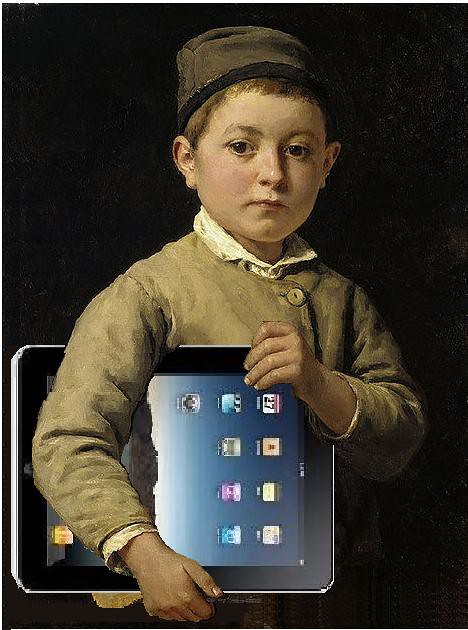The most valuable aspect of a 1:1 program is the technologies ability to assist with differentiation. iPads and Chromebooks allow for a dynamic learning experience that can change and react to the student's needs. As time goes by this capability is going to become more sophisticated, but that's a topic for another time.
One of my favorite ways to customize the learning to student's various needs is to use Google Presentation (it's like Powerpoint) to create an interactive textbook. The interactivity isn't fancy; there aren't any ancient Roman artifacts that can be manipulated in three-dimensions. What it does do is allow students to work at their own speed and, in most cases, learn in a variety of ways (read it, hear it, watch it, share it, etc.). Using Google Presentation means that students can access this material from any web-connected device and I can make changes to it depending on student needs. If students don't understand the difference between a subject and object it is very easy to add another page of examples, link to another website, embed a video, or post on a classroom discussion board.most importantly, it answers the easy questions (what's an adjective, etc.) and frees me up to work 1-on-1 and in small groups to improve the difficult things (voice, word choice, etc.).
Here are some examples. As you look through them you will notice there are some websites I link frequently. For instance, TodaysMeet.com gets used almost every week as a formative learning assessment. There are often links to Purdue's Online Writing Lab or other websites that might help reinforce a concept.
Unit 1: Science FictionWeek 1 and 2: Complete Sentences
https://docs.google.com/a/spooner.k12.wi.us/presentation/d/1pD69ymQI_1ZkY2MIhJqPjF_MR6JuGGNmw-eSkDBMoK4/edit#slide=id.g10483fe87_0135
Week 3 and 4: Building Science Fiction
https://docs.google.com/a/spooner.k12.wi.us/presentation/d/1fYqDtkYk4RStqhLwoc4cd3Ftj6vzmpHFPTM91lCfCNE/edit#slide=id.g106c04f09_053
Week 5 & 6: We reviewed some concepts from 1-4, took a field trip on Friday, and got caught up on missing work. Look for Week 7 & 8 soon!
Week 7 & 8: Creating Your Science Fiction Story: https://docs.google.com/presentation/d/1eUo7iEV4GOUPALrqN7dkFcwRKAwlV3_HogvaPbqUtl8/edit?usp=sharing
Unit 2: Business World
Slideshow 1: https://docs.google.com/a/spooner.k12.wi.us/presentation/d/1LZ-98WOJ-hvJ_TBp--7A6mF0zi-S8NrCIlv9eMLV3ec/edit?pli=1#slide=id.p
Unit 3: Medieval Europe
Etymology Project: https://docs.google.com/a/spooner.k12.wi.us/presentation/d/1NJGMrwT_H37qh8HwK4HVi_fVY4h9CxtPgxFAe13SQEY/edit#slide=id.g2b5f71dbf_111
Similes and Metaphors: https://docs.google.com/a/spooner.k12.wi.us/presentation/d/1XSWLs89VyP49UFzrJhzyBF6RxZHl_FX_wo-zC9gnny4/edit#slide=id.g1c7b6216c_015
Imagery: https://docs.google.com/a/spooner.k12.wi.us/presentation/d/11W1l-j9s6AW4WlFPFBQdQNojuKC0j1ljO4MYI-ItlOc/edit#slide=id.g2c2e2072e_011

No comments:
Post a Comment
Please feel free to share your ideas, questions, and comments. That is what the Internet is about!